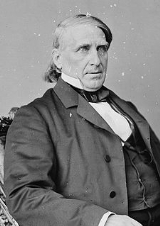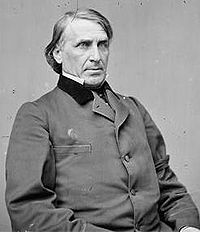
Elihu B. Washburne
Encyclopedia
Elihu Benjamin Washburne (September 23, 1816, Livermore, Maine
– October 23, 1887, Chicago, Illinois) was one of seven brothers who played a prominent role in the early formation of the United States Republican Party
. He later served as United States Secretary of State
in 1869.
Washburne, a resident of Galena, Illinois
, represented northwestern Illinois
in the United States House of Representatives
from 1853 to 1869. While in Congress, he was also a member of the powerful Appropriations Committee.
He was known for his courage, and met President-elect
Abraham Lincoln
upon his arrival in Washington, D.C.
on February 23, 1861. An assassination attempt was feared, and other Republican Party leaders were afraid to take on this duty. Washburne and his brothers had hidden the whereabouts of President-elect Lincoln by personally cutting telegraph
wires in key locations.
 Originally a Whig
Originally a Whig
, Washburne was an early member of the Republicans and a leader of the Radical Republicans. He was among the original proponents of legal racial equality. As a congressman, he served on the Joint Committee on Reconstruction
which drafted the Fourteenth Amendment to the United States Constitution
. After the Civil War
, Washburne advocated that large plantations be divided up to provide compensatory property for freed slaves.
Washburne served as President Ulysses S. Grant
's Secretary of State
, replacing William H. Seward
, for twelve days in March 1869; it remains the shortest term of any Secretary of State. He then became minister -- head of the U.S. diplomatic mission -- to France
, where he was influential in negotiating the armistice for the Franco-Prussian War
.
Washburne retired from government in 1876, although he was mentioned as a presidential candidate at the Republican conventions in 1880
and 1884
. He moved to Chicago, Illinois, and served as president of the Chicago Historical Society from 1884 to 1887.
Three of Washburne's brothers (Cadwallader C. Washburn
, William D. Washburn
, and Israel Washburn, Jr.
) also became politicians. His son, Hempstead Washburne
, was mayor of Chicago from 1891 to 1893.
Washburne Street at 1230 south in Chicago is named in honor of Elihu Washburne.
Livermore, Maine
Livermore is a town in Androscoggin County, Maine, United States. The population was 2,106 at the 2000 census. It is included in both the Lewiston-Auburn, Maine Metropolitan Statistical Area and the Lewiston-Auburn, Maine Metropolitan New England City and Town Area. High schools students from...
– October 23, 1887, Chicago, Illinois) was one of seven brothers who played a prominent role in the early formation of the United States Republican Party
Republican Party (United States)
The Republican Party is one of the two major contemporary political parties in the United States, along with the Democratic Party. Founded by anti-slavery expansion activists in 1854, it is often called the GOP . The party's platform generally reflects American conservatism in the U.S...
. He later served as United States Secretary of State
United States Secretary of State
The United States Secretary of State is the head of the United States Department of State, concerned with foreign affairs. The Secretary is a member of the Cabinet and the highest-ranking cabinet secretary both in line of succession and order of precedence...
in 1869.
Washburne, a resident of Galena, Illinois
Galena, Illinois
Galena is the county seat of, and largest city in, Jo Daviess County, Illinois in the United States, with a population of 3,429 in 2010. The city is a popular tourist destination known for its history, historical architecture, and ski and golf resorts. Galena was the residence of Ulysses S...
, represented northwestern Illinois
Illinois
Illinois is the fifth-most populous state of the United States of America, and is often noted for being a microcosm of the entire country. With Chicago in the northeast, small industrial cities and great agricultural productivity in central and northern Illinois, and natural resources like coal,...
in the United States House of Representatives
United States House of Representatives
The United States House of Representatives is one of the two Houses of the United States Congress, the bicameral legislature which also includes the Senate.The composition and powers of the House are established in Article One of the Constitution...
from 1853 to 1869. While in Congress, he was also a member of the powerful Appropriations Committee.
He was known for his courage, and met President-elect
President-elect
An -elect is a political candidate who has been elected to an office but who has not yet been sworn in or officially taken office. These may include an incoming president, senator, representative, governor and mayor.Analogously, the term "designate" An -elect is a political candidate who has been...
Abraham Lincoln
Abraham Lincoln
Abraham Lincoln was the 16th President of the United States, serving from March 1861 until his assassination in April 1865. He successfully led his country through a great constitutional, military and moral crisis – the American Civil War – preserving the Union, while ending slavery, and...
upon his arrival in Washington, D.C.
Washington, D.C.
Washington, D.C., formally the District of Columbia and commonly referred to as Washington, "the District", or simply D.C., is the capital of the United States. On July 16, 1790, the United States Congress approved the creation of a permanent national capital as permitted by the U.S. Constitution....
on February 23, 1861. An assassination attempt was feared, and other Republican Party leaders were afraid to take on this duty. Washburne and his brothers had hidden the whereabouts of President-elect Lincoln by personally cutting telegraph
Electrical telegraph
An electrical telegraph is a telegraph that uses electrical signals, usually conveyed via telecommunication lines or radio. The electromagnetic telegraph is a device for human-to-human transmission of coded text messages....
wires in key locations.

Whig Party (United States)
The Whig Party was a political party of the United States during the era of Jacksonian democracy. Considered integral to the Second Party System and operating from the early 1830s to the mid-1850s, the party was formed in opposition to the policies of President Andrew Jackson and his Democratic...
, Washburne was an early member of the Republicans and a leader of the Radical Republicans. He was among the original proponents of legal racial equality. As a congressman, he served on the Joint Committee on Reconstruction
United States Congress Joint Committee on Reconstruction
The Joint Committee on Reconstruction, also known as the Joint Committee of Fifteen, was a joint committee of the United States Congress that played a major role in Reconstruction in the wake of the American Civil War...
which drafted the Fourteenth Amendment to the United States Constitution
Fourteenth Amendment to the United States Constitution
The Fourteenth Amendment to the United States Constitution was adopted on July 9, 1868, as one of the Reconstruction Amendments.Its Citizenship Clause provides a broad definition of citizenship that overruled the Dred Scott v...
. After the Civil War
American Civil War
The American Civil War was a civil war fought in the United States of America. In response to the election of Abraham Lincoln as President of the United States, 11 southern slave states declared their secession from the United States and formed the Confederate States of America ; the other 25...
, Washburne advocated that large plantations be divided up to provide compensatory property for freed slaves.
Washburne served as President Ulysses S. Grant
Ulysses S. Grant
Ulysses S. Grant was the 18th President of the United States as well as military commander during the Civil War and post-war Reconstruction periods. Under Grant's command, the Union Army defeated the Confederate military and ended the Confederate States of America...
's Secretary of State
United States Secretary of State
The United States Secretary of State is the head of the United States Department of State, concerned with foreign affairs. The Secretary is a member of the Cabinet and the highest-ranking cabinet secretary both in line of succession and order of precedence...
, replacing William H. Seward
William H. Seward
William Henry Seward, Sr. was the 12th Governor of New York, United States Senator and the United States Secretary of State under Abraham Lincoln and Andrew Johnson...
, for twelve days in March 1869; it remains the shortest term of any Secretary of State. He then became minister -- head of the U.S. diplomatic mission -- to France
France
The French Republic , The French Republic , The French Republic , (commonly known as France , is a unitary semi-presidential republic in Western Europe with several overseas territories and islands located on other continents and in the Indian, Pacific, and Atlantic oceans. Metropolitan France...
, where he was influential in negotiating the armistice for the Franco-Prussian War
Franco-Prussian War
The Franco-Prussian War or Franco-German War, often referred to in France as the 1870 War was a conflict between the Second French Empire and the Kingdom of Prussia. Prussia was aided by the North German Confederation, of which it was a member, and the South German states of Baden, Württemberg and...
.
Washburne retired from government in 1876, although he was mentioned as a presidential candidate at the Republican conventions in 1880
1880 Republican National Convention
The 1880 Republican National Convention convened from June 2 to June 8, 1880 at the Interstate Exposition Building in Chicago, Illinois, United States, and nominated James A. Garfield and Chester A...
and 1884
1884 Republican National Convention
The 1884 Republican National Convention was a presidential nominating convention held at the Exposition Hall in Chicago, Illinois, on June 3–6, 1884. It resulted in the nomination of James G. Blaine and John A. Logan for President and Vice President of the United States. The ticket lost in the...
. He moved to Chicago, Illinois, and served as president of the Chicago Historical Society from 1884 to 1887.
Three of Washburne's brothers (Cadwallader C. Washburn
Cadwallader C. Washburn
Cadwallader Colden Washburn was an American businessman, politician, and soldier noted for founding what would later become General Mills and working in government for Wisconsin. He was born in Livermore, Maine, one of seven brothers that included Israel Washburn, Jr., Elihu B. Washburne, William D...
, William D. Washburn
William D. Washburn
William Drew Washburn was an American politician. He served in both the United States House of Representatives and the United States Senate as a Republican from Minnesota. Three of his seven brothers became politicians: Elihu B. Washburne, Cadwallader C. Washburn, and Israel Washburn, Jr...
, and Israel Washburn, Jr.
Israel Washburn, Jr.
Israel Washburn, Jr. was a United States political figure. Originally a member of the Whig Party, he later became a founding member of the Republican Party....
) also became politicians. His son, Hempstead Washburne
Hempstead Washburne
Hempstead Washburne served as mayor of Chicago, Illinois for the Republican Party. He was the son of Elihu B. Washburne, Congressman, Secretary of State, and Minister to France....
, was mayor of Chicago from 1891 to 1893.
Washburne Street at 1230 south in Chicago is named in honor of Elihu Washburne.
External links
- An Online Biography of Washburne. Includes Guide to Research Collections where his papers are located.
- Israel, Elihu and Cadwallader Washburn: A Chapter in American Biography

